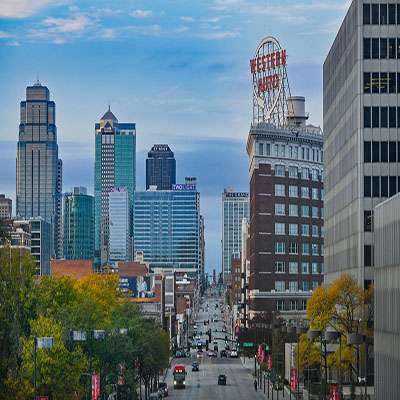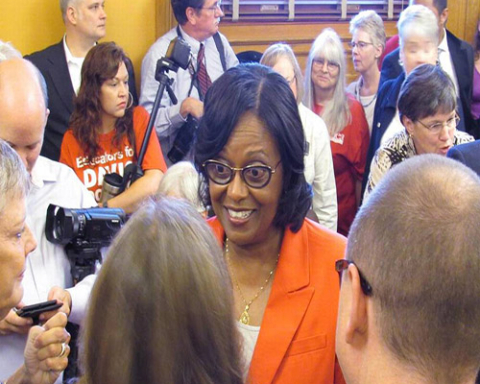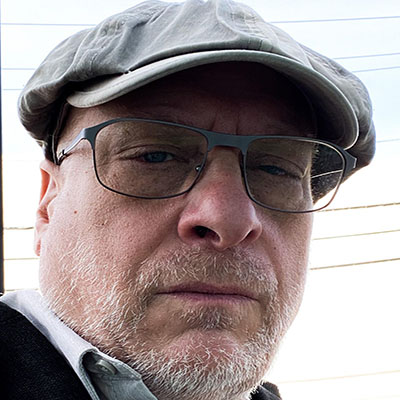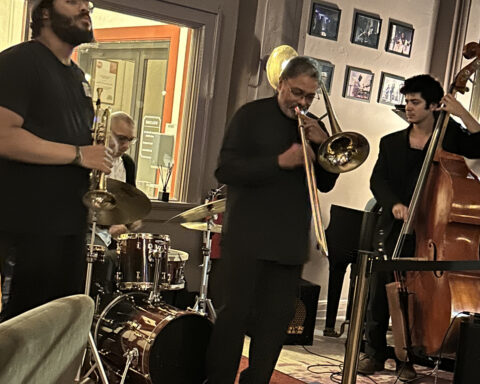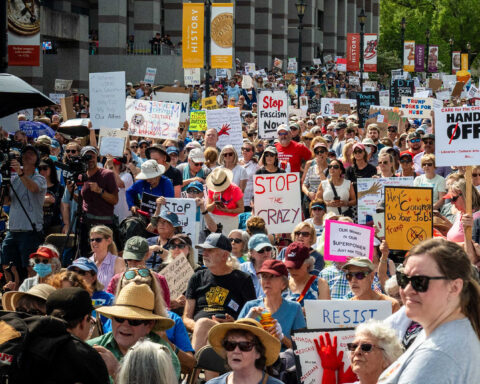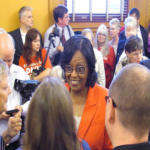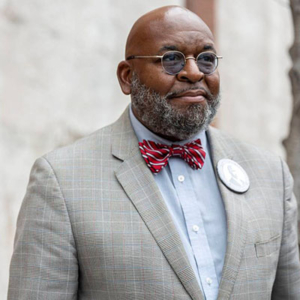
KANSAS CITY, Mo. — Mickey Dean hears the argument often, particularly from white Kansas Citians, when he mentions Black reparations: “You weren’t a slave and my family didn’t own any slaves, so that’s in the past and why are we still talking about that?”
He gets the questions more frequently now that the Kansas City Council approved a commission to study reparations locally. So he’s on a mission to educate people on the topic, an increasingly popular one across the country.
Yes, reparations is about what’s owed in exchange for the free labor of slavery from which white people made millions in profits. But it’s about what happened after slavery too, he says. Reconstruction without repair to Black lives, Jim Crow laws that legalized racial segregation, Plessy v. Ferguson and segregation. Laws that shut out Black Americans from basic rights.
“It’s just amazing the way Black people have been disenfranchised,” said Dean, who co-founded the Kansas City Reparations Coalition, a group made up of representatives from numerous local organizations which helped draft the initial reparations ordinance in Kansas City.
The creation of a commission does not guarantee reparations will happen in Kansas City. But it is the intention. The group, yet to be chosen by Mayor Quinton Lucas, will study the harm done to Black Kansas Citians across five areas: health, wealth, home-ownership, criminal justice and educational outcomes.
“We’re saying now is the time for Black repair,” said Rev. Vernon Howard, President of the Southern Christian Leadership Conference. What’s not yet been determined is what that repair will look like, even if it does in fact happen.
How far back do reparations go?
The birth of Black reparations in America arrived on Jan. 16, 1865, when Union Gen. William Tecumseh Sherman promised 40 acres and then a mule to freed former slaves. That order — Special Field Orders No. 15 — was overturned by President Andrew Johnson a few months later, after President Abraham Lincoln was assassinated.
Other forms of reparations for harmed groups have since succeeded.
After World War II, Germany gave $89 million that primarily went to survivors of the Holocaust, doled out in both one-time and long-term pensions.
In post-apartheid South Africa, victims of the government-sanctioned atrocities were given one-time payments of $3,900. And in the United States, survivors of Japanese American internment camps were able to collect $20,000 each in reparations.
Congress previously approved the Indian Claims Commission, which paid out less than $1,000 to each Native American in the U.S. before the commission was dissolved in 1978. It’s not believed that any of these forms of reparations came close to remedying the true economic losses suffered by each group.
The effort to obtain repair for Black Americans took another step forward in 1987, with the founding of the National Coalition of Black for Reparations In America, which remains the leading national organization fighting for reparations.
The murder of George Floyd in May 2020 renewed calls for reparations across the nation. In November 2020, the KC Reparations Coalition formed.
“Ten years ago, if we mentioned the word reparations, you’d just get the side eye from people like this is some impossible dream,” Dean said.
The following year, HR 40, a bill introduced in 1989 to study reparations, was given new life as a bill to remedy Black reparations on a federal level. As of 2020, the average white family had ten times the wealth of the average Black family in America, according to the Brookings Institution.
Some government leaders, through reparations, hope to narrow that divide. Every major civil rights organization has issued a statement in support of reparations, alongside support from a few white-led religious denominations. As of January 2022, few cities had actually approved Black reparation plans. But at least a dozen cities, including Kansas City, and a handful of states, were considering it.
In March 2021, Evanston, Illinois, became the first city to make reparations available to Black residents harmed by past discrimination and the long-term effects of slavery by promising $10 million over 10 years funded by recreational marijuana tax revenue. Qualifying Black households can receive $25,000 for home repairs, down payments on property, and interest or late penalties on property in the city.
Here’s what some other cities are doing:
— Amherst (Massachusetts) Town Council created a fund to allot $2 million in reparations across about 10 years.
— San Francisco is considering a one-time payment of $5 million to every eligible Black community member.
— Asheville, North Carolina’s finalized reparations plan does not involve direct payments, but rather a financial investment in programs that aim to increase Black home-ownership and business and career opportunities.
— Leaders in Providence, Rhode Island, recently approved a $10 million budget to put towards an eventual reparations program.
Other cities considering reparations, like Kansas City, include St. Louis; Boston; St. Paul, Minnesota; Detroit; New York City and state; and the state of California, with more localized efforts in cities including Los Angeles, Berkeley, Sacramento and Oakland.
Some cities first allot a pool of money to reparations, then appoint a commission to figure out how to distribute it. Kansas City is doing the opposite by first completing a study to identify the city’s unique problems before allocating money to a solution.
Why do leaders say reparations are needed in Kansas City?
Howard said Kansas City, “a shining light of the disparities that exist within Black America,” is well-positioned to be among the first to take part in the conversation of reparations.
“In every category of wellness in Kansas City, the Black citizenry lags,” he said. “I mean, think about it … there is a 30-35% poverty rate for Black people in Kansas City. I mean, oh my, oh my! How can we then not understand some of the challenges that Black people face in living day-to-day with respect to criminal justice and health disparities and so forth.”
Dean hopes the commission, in addition to looking at historic harm and disinvestment caused by the government, also looks closely at discrimination surrounding institutions controlling education, business and housing.
A few examples, pulled from city data and from the reparations ordinance:
— A 2016 Kansas City disparity study found that 86 percent of $1.97 billion in local contracts were awarded to white-owned firms; Black-owned firms were awarded 7%.
— ZIP code 64128, which is predominantly Black, has the city’s lowest life expectancy at 68.1 years; ZIP code 64113, which is predominantly white, has the highest life expectancy at 86.3 years.
— More than 75% of white residents are homeowners; fewer than 45% of Black residents are homeowners.
— The median household net worth of white families is $188,200 and the median net worth of Black families is $24,100.
— In 2020, Black drivers were 23% more likely to be stopped by the Kansas City Police Department than white drivers.
What’s next for Kansas City?
Among the questions Howard hopes the commission will explore: “What has been the unique ways and means, if you will, of oppression of Black people in this city?”
A major focus will likely be the harm inflicted by redlining, the systematic discrimination of Black people in housing and home-ownership. Kansas City developer J.C. Nichols put the practice into play both in Kansas City and on a federal level in the 1930s, excluding countless Black families from white neighborhoods.
“Our struggle for repair and justice has always been met with violence from this country, and we have never gone back to reconcile and repair Black life from the ravages of slavery, and not only slavery, but also racial discrimination that has blocked Black access from the basic blessings of American life,” Howard said.
Mayor Lucas has 90 days from the approval of the ordinance in mid-January to appoint commission members “who understand and are sensitive to the needs of the Black community,” the ordinance reads.
Dean believes all the commission members should be Black community members, leaders and experts in the injury areas because “only the people who have been injured can determine the remedies.”
The commission is required to submit a preliminary report of its findings no more than a year after its first meeting. A final report is due six months after that. The city will then review and consider the proposals.
Dean said the set turnaround for Kansas City’s commission is quick compared to other city commissions, which often have between 18 and 24 months to develop a plan. But if provided sufficient staffing and funding, he believes Kansas City can pull off the tighter timeline.
And, he said, the moment is right. There’s growing interest in the topic in Kansas City. The SCLC held a well-attended panel on reparations as part of a Martin Luther King Jr. celebration last month. While Dean insists the city commission be Black, he hopes that people from every background will become involved in the coalition, which is working to educate the community on reparations.
But he also doesn’t expect this process to cross the finish line without opposition. While the city council voted unanimously on a resolution supporting HR 40, one council member, Heather Hall, District 1, voted in opposition of the ordinance forming a reparations commission.
By the time the commission’s recommendations are complete, the city will have a new council seated, and could have a new mayor. And once money is tied to an ordinance, it’s reasonable to expect more opposition. Howard quoted scripture, Proverbs 13:12: “Hope deferred makes the heart sick.”
The community members he’s spoken with have expressed excitement and gratitude, Howard said, but there’s also apprehension. “Will we really rally together and do what’s right?” he asked. “I think that’s the question mark on the table. But we continue to have hope and believe that it will happen.”
———
©2023 The Kansas City Star. Visit kansascity.com. Distributed by Tribune Content Agency, LLC.

